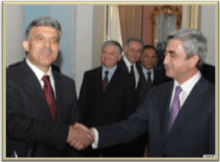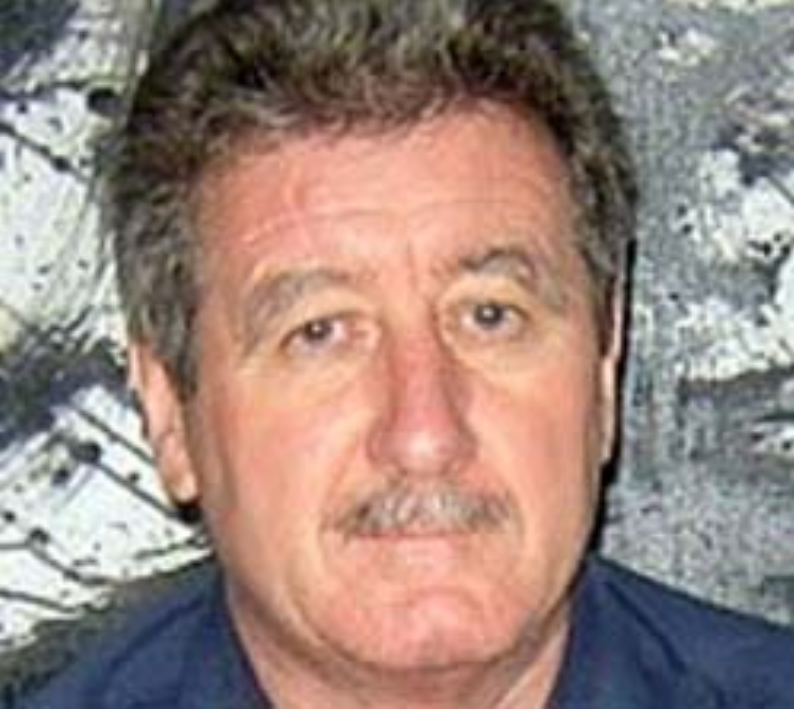 With Turkish / Armenian negotiations reaching a peak, the focus of attention is moving from the wider debate to petty bickering over who said this and who said that, the inevitable outcome of a process in which a country’s leaders discuss fundamentals of agreements with their international counterparts then hide the truth from their domestic audience. The Armenian negotiating parties, President Sargsyan and MFA Nalbandian, have unashamedly deceived the Armenian public with respect to their year-long negotiations on Karabakh and Genocide. Today, they would have the Armenian public believe that Turkey has suddenly introduced pre-conditions for opening the border, an untrue statement and particularly alarming as it came immediately after discussions with the US President in Turkey, which surely must have led to a common understanding between Turkey, Armenia and the US. True, the Turkish side did change its position after Obama’s trip to Turkey and re-introduced Karabakh as a pre-condition. But in contrast to Armenia, Turkish reports on its position have been consistent, in Ankara, in Baku and in Yerevan.
With Turkish / Armenian negotiations reaching a peak, the focus of attention is moving from the wider debate to petty bickering over who said this and who said that, the inevitable outcome of a process in which a country’s leaders discuss fundamentals of agreements with their international counterparts then hide the truth from their domestic audience. The Armenian negotiating parties, President Sargsyan and MFA Nalbandian, have unashamedly deceived the Armenian public with respect to their year-long negotiations on Karabakh and Genocide. Today, they would have the Armenian public believe that Turkey has suddenly introduced pre-conditions for opening the border, an untrue statement and particularly alarming as it came immediately after discussions with the US President in Turkey, which surely must have led to a common understanding between Turkey, Armenia and the US. True, the Turkish side did change its position after Obama’s trip to Turkey and re-introduced Karabakh as a pre-condition. But in contrast to Armenia, Turkish reports on its position have been consistent, in Ankara, in Baku and in Yerevan.
Turkey resolutely denies that the hostilities involving the slaughter of Armenians in the early 20th century amounted to Genocide and each year it spends considerable resources to defend its position, especially in the US. This year Turkey’s leaders spent several months and went to extraordinary lengths to avoid US recognition, realizing the new US President and most of his senior administration supported Armenia’s claim of Genocide. That is understandable from a Turkish perspective. But it is disturbing that the Armenian negotiating parties have not added their voices to the Armenian lobby for the US to recognize Genocide, but understandable, as US recognition would put a stop to the plan they have been doing all they can to keep from the Armenian public. Sargsyan and Nalbandian have been ‘warming to the Turkish proposal to establish a commission of historians’ and they have said so on several occasions, not for the good of the Armenian Republic, but in pursuit of personal gain.
On April 6th and 7th, Turkey was host to the US President, first in Ankara then in Istanbul, hailed as the highlight of Obama’s European tour. Several weeks prior to the Obama visit, Turkey announced that it had removed the Karabakh issue from its list of pre-conditions for opening the Turkish / Armenian border, seemingly infuriating Azerbaijan, but clearly a tactical move to demonstrate Turkish acquiescence in a ‘warming relationship’ with the Armenian administration and part of Turkey’s concerted effort to avoid what seemed to be an inevitable US Genocide recognition. The Obama trip went according to plan with the US and Turkey singing each others praise. But for Armenia, whilst Obama confirmed his personal position had not changed, he avoided using the word Genocide.
Armenia’s MFA Nalbandian decided not to travel to Ankara to meet with US President Obama on the 6th April as planned, but he eventually managed to find time on April 7th in Istanbul. He returned to Yerevan bristling with confidence of an imminent border opening and assuring the Armenian public that he and his President would do nothing to jeopardize a possible US recognition of Genocide. In fact, they had already done their damndest to jeopardize a possible US recognition of Genocide, they had announced that negotiations with Turkey were developing well and they anticipated an early opening of the Armenian / Turkish border – possibly in April. Under these circumstances it would have been confrontational for Obama to talk about Armenia’s ‘Genocide’ in Turkey and he would have been blamed for spoiling the Turkish – Armenian reconciliation process.
Nalbandian had barely finished his press conference in Yerevan, when Turkey announced in Ankara, Baku and Yerevan that it was to re-introduce Karabakh to the border-opening list of pre-conditions, a seemingly provocative move, especially after the Obama visit and only two weeks prior to a much anticipated 24th April Obama declaration on Genocide in the US. The Turkish move completely contradicted Nalbandian’s statement, plus many such Nalbandian statements in the run-up to Obama’s trip to Turkey. Sargsyan responded in Yerevan, accusing Turkey of suddenly introducing hitherto unknown pre-conditions, although pre-conditions have been known and documented throughout the nearly year-long negotiation process, and neither Sargsyan nor his Minister of Foreign Affairs had ever explained in Armenia how they had been resolved. However, the ‘newly introduced pre-condition’ did not dampen Sargsyan’s enthusiasm and he re-confirmed he would be travelling through the newly opened border on his way to watch football in Turkey this October.
From this somewhat implausible chain of events, it is presumably to be believed that President Gul had a change of heart after negotiations between President Obama and Armenia’s MFA Nalbandian; that he decided to slap the well-intentioned face of his most powerful strategic ally by revoking on this critical and most sensitive of issues. If true, that would surely invoke US recognition of Armenia’s Genocide on the 24th.
Of course not, Turkey’s President Gul would never concede on the Genocide issue, knowing that 90 percent of the Turkish population is opposed, and at a time when his ratings had plummeted in a keenly contested democratic election. The conclusion can only be that Obama left Turkey thankful and relieved that Turkey and Armenia had agreed to resolve the Genocide issue between them, through Turkey’s commission of historians, or some other such mechanism. Armenia’s President Sargsyan is on record as saying he has no ambitions with regard the historic Armenian lands in the eastern part of Turkey, so only the Karabakh issue needs to be resolved for him to travel through the border in October this year, and Bryza’s opinion is that Karabakh will soon be resolved.
Armenia’s former President Kocharian has been preparing his deal on Karabakh for several years, held back firstly by the lack of an acceptable Azerbaijani compensation package, and secondly his nerve to commit to the deal, knowing he would face the backlash from an angry Armenian public. Kocharian waited his time and supported Sargsyan as his successor on the understanding that Sargsyan, when President, would go through with the agreement he dare not sign.
However, in the same way that Turkey would never withdraw its support from Azerbaijan with regard Karabakh, Azerbaijan is equally committed to supporting Turkey on Genocide. In July 2008, seeing that Sargsyan was determined to finalize the Kocharian deal on Karabakh, the Azerbaijani / Turkish allies joined forces and threw Genocide into the equation, knowing the self-imposed illegitimate Sargsyan regime would jump at the chance of adding to the package of compensation it was demanding in return for one of Armenia’s very few state assets left after Kocharian’s eight years of pillaging – Karabakh.
In August 2008, the Georgia conflict prompted Moscow to force the pace of negotiations, so Medvedev dangled a $500 million carrot; then the World economic crisis presented the opportunity for the US to throw a billion or so more dollars into the pot, conveniently facilitated by the World Bank and the IMF. Now half the World is on tenterhooks, waiting the next episode in this most unsavory Caucuses conflict resolution saga, which is due this 24th April in New York.
The Kocharian / Sargsyan Karabakh ‘Ace’ has already been played several times with the EU and PACE to chock up the illegitimate Sargsyan Presidency. Soon it will be played for the last time, to draw massive compensation in return for a beneficial agreement for Azerbaijan on Karabakh and for a Turkish commission of historians to finally eliminate Armenia’s claims of Genocide.
Turkey and Azerbaijan will have solved their longstanding problems with Armenia, the US will have been relieved the burden of Genocide recognition, Russia will see additional political clout and economic benefits in the Caucuses, and the Sargsyan / Kocharian regime will have a compensation package worth several billion dollars.
The vast majority of Armenians will be hoping that the US president stands by his promise and formally recognizes the Armenian Genocide this 24th April; in the longer term it will be beneficial to all parties concerned. Otherwise the Kocharian / Sargsyan regime will be having to cope with the backlash in Armenia, after having sold Armenia down the river with their ‘Karabakh / Genocide Deal’.

 The Turkish petrochemical holding Petkim whose 51 percent of stakes belong to the State Oil Company of Azerbaijan Republic (SOCAR) in alliance with Turcas will build a petrochemical plant in Iran which will produce methanol and polyethylene. Turcas Board of Directors Chairman Erdal Aksoy said, Petkim’s official Web site reported.
The Turkish petrochemical holding Petkim whose 51 percent of stakes belong to the State Oil Company of Azerbaijan Republic (SOCAR) in alliance with Turcas will build a petrochemical plant in Iran which will produce methanol and polyethylene. Turcas Board of Directors Chairman Erdal Aksoy said, Petkim’s official Web site reported.




 With Turkish / Armenian negotiations reaching a peak, the focus of attention is moving from the wider debate to petty bickering over who said this and who said that, the inevitable outcome of a process in which a country’s leaders discuss fundamentals of agreements with their international counterparts then hide the truth from their domestic audience. The Armenian negotiating parties, President Sargsyan and MFA Nalbandian, have unashamedly deceived the Armenian public with respect to their year-long negotiations on Karabakh and Genocide. Today, they would have the Armenian public believe that Turkey has suddenly introduced pre-conditions for opening the border, an untrue statement and particularly alarming as it came immediately after discussions with the US President in Turkey, which surely must have led to a common understanding between Turkey, Armenia and the US. True, the Turkish side did change its position after Obama’s trip to Turkey and re-introduced Karabakh as a pre-condition. But in contrast to Armenia, Turkish reports on its position have been consistent, in Ankara, in Baku and in Yerevan.
With Turkish / Armenian negotiations reaching a peak, the focus of attention is moving from the wider debate to petty bickering over who said this and who said that, the inevitable outcome of a process in which a country’s leaders discuss fundamentals of agreements with their international counterparts then hide the truth from their domestic audience. The Armenian negotiating parties, President Sargsyan and MFA Nalbandian, have unashamedly deceived the Armenian public with respect to their year-long negotiations on Karabakh and Genocide. Today, they would have the Armenian public believe that Turkey has suddenly introduced pre-conditions for opening the border, an untrue statement and particularly alarming as it came immediately after discussions with the US President in Turkey, which surely must have led to a common understanding between Turkey, Armenia and the US. True, the Turkish side did change its position after Obama’s trip to Turkey and re-introduced Karabakh as a pre-condition. But in contrast to Armenia, Turkish reports on its position have been consistent, in Ankara, in Baku and in Yerevan.